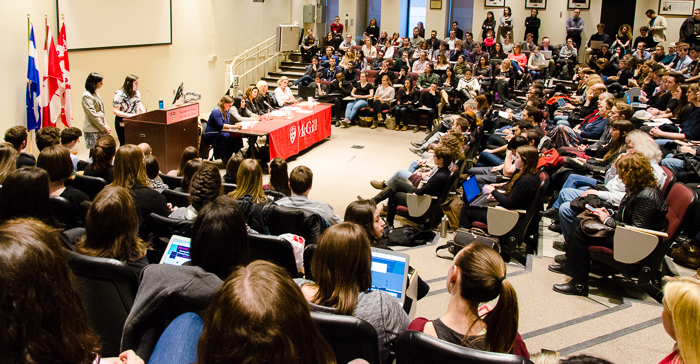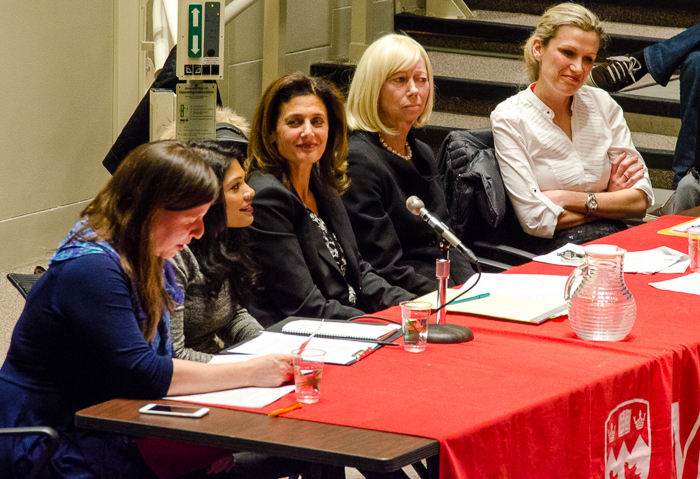
On March 29, first year law students Anna Goldfinch and Nazampal Jaswal hosted a panel discussion about creating ethical practices in criminal sexual assault cases in the wake of the Ghomeshi verdict.
The recent Jian Ghomeshi case led to unprecedented discussion in the media on what sexual assault looks like in our society.
With focus on the Ghomeshi case, McGill students Anna Goldfinch and Nazampal Jaswal believed it was important to use this opportunity to have a broader conversation about sexual assault and the criminal justice system in Canada. The purpose Beyond Ghomeshi: Creating Ethical Practices in Criminal Sexual Assault Trials, was to have an informed discussion from a variety of experts to help students, faculty and the wider legal community.
The panel brought together academics, practitioners, and activists to ensure a holistic discussion of this complex issue. The panel was comprised of crown prosecutor Sara Henningsson, criminal defence lawyer Suzanne Costom, Constance Backhouse, a feminist legal historian and law professor at the University of Ottawa, and Chenthoori Malankov, a community activist, support worker, and artist. The panel was moderated by Alana Klein, criminal law professor at the McGill Faculty of Law.
Professor Backhouse began the discussion by giving the legal history of sexual assault in Canada. She explained that the sexist and antiquated notions that once permeated the courtroom during sexual assault cases may formally be gone, but they still colour the way complainants are treated and the way their behaviour is interpreted. Professor Backhouse underlined that while there is no perfect victim, our courts often still search for one to find a conviction.
Me. Suzanne Costom spoke to the importance of maintaining a heavy burden of proof in criminal sexual assault cases, especially to avoid minimize risk of wrongful convictions. She also believed that lowering the burden of proof would be damaging to women, saying, “It is an insult to us to suggest that our testimony should be subject to a lower standard than other witnesses.”
Given the confusion in the media about the role of the Crown in the Ghomeshi case, Me. Henningsson spoke about the responsibilities of a prosecutor. She explained that the Crown’s goal is not necessarily to convict; rather, the Crown holds a public duty to provide all available legal proof of the facts.
Chenthoori Malankov spoke to the fact that many assault survivors do not even make it to the steps of the courtroom because of the problems that occur before they enter the legal sphere. This includes the shame imposed on complainants, and barriers to interacting with the police during reporting. Malankov made it clear that communities need to be involved in ensuring that the support and care provided is survivor-centric, whether it is in the legal system or not.
While the panellists all came from different backgrounds, they agreed that change is needed, including better training of journalists, judges and lawyers to handle sexual assault cases. Additionally, all panellists agreed that change needs to be holistic, including consent education for young people and better supports inside and outside the courtroom. Anna and Nazampal hope that students in the Faculty will be able to build on the conversations in the near future.

